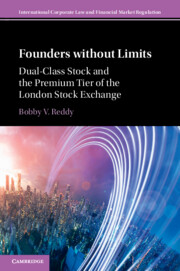Book contents
- Founders without Limits
- Cambridge University Press
- Founders without Limits
- Copyright page
- Contents
- Figures
- Tables
- Preface
- Acknowledgements
- Table of Cases
- Table of Legislation and Regulation
- Abbreviations
- Introduction
- Part I Putting Dual-Class Stock into Context
- Part II Evaluating Dual-Class Stock
- 5 From Controlling Shareholders to Dual-Class Stock
- 6 Theoretical Benefits and Detriments of Dual-Class Stock
- 7 The Empirical Evidence on Dual-Class Stock
- Part III Formulating a Policy on Dual-Class Stock
- Appendix Comparison of Inferior-Voting Shareholder Protections on Major Dual-Class Stock Exchanges
- Index
6 - Theoretical Benefits and Detriments of Dual-Class Stock
from Part II - Evaluating Dual-Class Stock
Published online by Cambridge University Press: 29 October 2021
- Founders without Limits
- Cambridge University Press
- Founders without Limits
- Copyright page
- Contents
- Figures
- Tables
- Preface
- Acknowledgements
- Table of Cases
- Table of Legislation and Regulation
- Abbreviations
- Introduction
- Part I Putting Dual-Class Stock into Context
- Part II Evaluating Dual-Class Stock
- 5 From Controlling Shareholders to Dual-Class Stock
- 6 Theoretical Benefits and Detriments of Dual-Class Stock
- 7 The Empirical Evidence on Dual-Class Stock
- Part III Formulating a Policy on Dual-Class Stock
- Appendix Comparison of Inferior-Voting Shareholder Protections on Major Dual-Class Stock Exchanges
- Index
Summary
The disproportionately low level of equity owned by controllers of dual-class firms can incentivise various behaviours in the way that they manage, or cause to be managed, their firms.With controllers feeling less of the consequences from their actions, controllers may be incentivised to ‘tunnel’ profits from the company, pay themselves high executive remuneration, cause the company to take decisions primarily in the pecuniary or non-pecuniary interests of the controller rather than in the interests of shareholder wealth, pass control to unsuitable heirs, block lucrative takeovers and, when takeovers do occur, extract control premia.Management is entrenched, meaning that when controllers take such actions, the public shareholders cannot change the management team.However, controller benefits may not just harm public shareholders, and certain controller benefits can incentivise actions that are neutral or beneficial to shareholder wealth, such as profitable related-party transactions, the bonding of a visionary founder to the firm, maximising takeover value, taking a long-term approach and risk-taking.A dual-class stock tradeoff exists, and if legal regulatory and market constraints can limit the extraction of pernicious controller benefits so that they are outweighed by benign controller benefits, the structure can be net beneficial for controllers and public shareholders alike.
Keywords
- Type
- Chapter
- Information
- Founders without LimitsDual-Class Stock and the Premium Tier of the London Stock Exchange, pp. 188 - 248Publisher: Cambridge University PressPrint publication year: 2021



